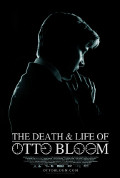
Directed by
Cris Jones
83 minutes
Rated M
Reviewed by
Chris Thompson

The Death and Life of Otto Bloom
Synopsis: This documentary-style film follows the rise and fall of Otto Bloom (Xavier Samuel) whose consciousness experiences life in a reverse timeframe remembering events from his future but having no recollection of his past. It tells the story from his being discovered in a lost boy’s home to the identification of his unique condition, "retrochronology", by scientist and eventual lover, Ada Fitzgerald (Matilda Brown and then Rachel Ward) to his wild affair with mega-rock-star Suzi Noon (Rose Riley) and his messianic rise to the position of a latter day prophet, challenging our preconceived notions about life, death and the nature of time.Two of the most narratively interesting and ambitious Australian films to hit our screens in the last couple of years have been the Spierig Brothers’ Predestination and Hugh Sullivan’s Infinite Man (both 2014). Each, in its own way, in something other than a strict chronological context, tackled the idea of traveling in time and how that relates to both our understanding of our place in the world and, more personally, the manifestation of love for another. There must be something in the water, because here is another really provocative and philosophical rendering of time and love and the meaning of existence into a story that, if you can get your brain around the logic of its premise, is thoughtful, moving, funny and tragic all at the same time (pun intended!).
The Death and Life of Otto Bloom is a bold enterprise for a first feature but writer/director Cris Jones’s move from the short to the long form exudes confidence in its material right from its engaging opening sequence through to the twisty tail of its end. For the most part, that confidence is justified. The talking-heads-looking-back-on-events documentary style is used to good effect, arousing our curiosity and keeping us engaged in the unfolding events and, just when we think our brains might explode with the mental gymnastics required to make sense of a story where two timelines are moving in opposite directions, along comes a helpful scientist (John Gaden) to explain the Einsteinian theories that make the narrative plausible (if not possible).
Jones has made some astute casting choices here. The calibre of the talking-heads characters is very high; in addition to Gaden, we see Jacek Koman, Tyler Coppin, Suzy Cato-Gashler, Terry Camilleri and, most importantly, Rachel Ward who, despite being limited by the head-shot-stare-down-the-camera-barrel constraints of her screen presence, is compelling and moving in the role of the older Ada character who first diagnoses Bloom’s condition, falls in love with him and then suffers the consequences of a relationship with a young man who must progressively forget what happens to him as he regresses through his memory from the present to the past. Yes, it takes a bit of working out because it’s not as simple to comprehend as David Fincher’s The Curious Case of Benjamin Button (2008) in which Button physically ages in reverse. Bloom’s condition is to do with his consciousness, not his physiology and that makes it all the more fascinating as we’re provoked to consider the nature of memory and time and the way we experience and record the events of our lives. Interestingly, the doco style allows Jones to make good use of many of those means of recording life events; newspaper and magazine headlines, video clips, home movies, television archives and the like. Of course they are all just records of single moments in time and it’s only our perception of the direction that time travels that assigns any forward chronology to them. Bloom, on the other hand, views them quite differently.
And speaking of Bloom, Xavier Samuel is perfectly cast as the handsome, charming, sad and tragic central character. His performance is pitched just right and is beautifully complemented by Matilda Brown as the Young Ada (and in a nice touch, she’s actually Ward’s real life daughter, so the resemblance is more than coincidental).
The film is not, perhaps, as profound a meditation on the nature of time as last year’s Arrival but then it doesn't pretend to be. For me, it got a little wobbly in its final moments as Ada has a revelation about how and why she and Bloom ended up together but, that aside, it’s a treat to see an intelligent, provocative, entertaining and very well made Australian film that successfully takes on some of the higher verities of life without becoming bogged down in self importance and navel-gazing.

Want more about this film?


Want something different?




